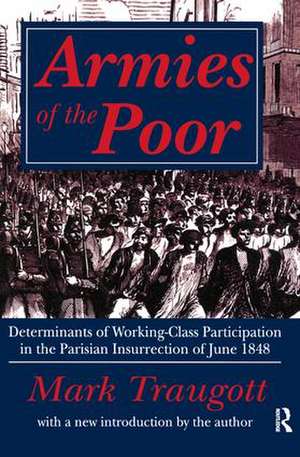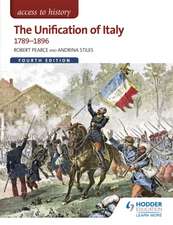Armies of the Poor: Determinants of Working-class Participation in in the Parisian Insurrection of June 1848
Autor Mark Traugotten Limba Engleză Hardback – 14 iul 2017
| Toate formatele și edițiile | Preț | Express |
|---|---|---|
| Paperback (1) | 416.22 lei 6-8 săpt. | |
| Taylor & Francis – 28 feb 2001 | 416.22 lei 6-8 săpt. | |
| Hardback (1) | 1000.27 lei 6-8 săpt. | |
| Taylor & Francis – 14 iul 2017 | 1000.27 lei 6-8 săpt. |
Preț: 1000.27 lei
Preț vechi: 1219.84 lei
-18% Nou
Puncte Express: 1500
Preț estimativ în valută:
191.43€ • 199.11$ • 158.03£
191.43€ • 199.11$ • 158.03£
Carte tipărită la comandă
Livrare economică 15-29 aprilie
Preluare comenzi: 021 569.72.76
Specificații
ISBN-13: 9781138518940
ISBN-10: 1138518948
Pagini: 293
Dimensiuni: 152 x 229 mm
Greutate: 0.45 kg
Ediția:1
Editura: Taylor & Francis
Colecția Routledge
Locul publicării:Oxford, United Kingdom
ISBN-10: 1138518948
Pagini: 293
Dimensiuni: 152 x 229 mm
Greutate: 0.45 kg
Ediția:1
Editura: Taylor & Francis
Colecția Routledge
Locul publicării:Oxford, United Kingdom
Cuprins
INTRODUCTION; PREFACE; ONE. The June Days of 1848 in Historical Perspective; The Parisian Economy in the Mid-Nineteenth Century Economic Crisis and the February Revolution; Chronology of the Early Second Republic; The June Insurrection in Historical Perspective TWO. The Constitution and Composition of the Parisian Mobile Guard; From the Barricades of February to the Barricades of June; Expectations of Mobile Guard Political Orientation; Contemporary Views of Mobile Guard Composition; The Empirical Investigation of Mobile Guard; The Cohort Hypothesis; THREE. An Organizational Analysis of Mobile Guard Political Orientation; The Constitution of the Mobile Guard Officer Corps; Practical Grievances; Mobile Guard Isolation; FOUR. The Transformation of the National Workshops from Instrument of Co-optation to Insurrectionary Core; The National Workshops as a Comparative Case; The Workshops' Role in the June Insurrection; Social Composition of the National Workshops; Changing Political Orientation, February to June; FIVE. Organizational Determinants of National Workshops' Political Orientation; Practical Grievances; Coherence of the Officer Corps; The Abrupt End to Workshops Isolation; SIX. The Organizational Analysis of the June Days; Explanations from Economic Factors; Explanations from Differences in Age; The Organizational Hypothesis; Concluding Remarks; Methodological Appendix: Procedures Used to Construct the Mobile Guard Sample
Descriere
In June 1848, two irregular armies of the urban poor fought a four-day battle in the streets of Paris that decided the fate of the French Second Republic



